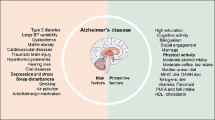Abstract
The aim of this contribution is to provide a few historical and conceptual insights on the question of the impact of current developments in the neurosciences on the concept of psychiatric disease. Alzheimer’s disease is a good example when considering this important question. On the one hand, Alzheimer’s disease has a somewhat ambiguous status in terms of disorders affecting the mind or the psyche. This ambiguous status is illustrated by the fact that one commonly qualifies Alzheimer’s disease as a ‘neuropsychiatric’ disorder, because it cannot easily be classified as either a ‘neurological’ or ‘psychiatric’ disorder. On the other hand, the concept of Alzheimer’s disease was created at the beginning of the twentieth century, as the neurosciences were beginning to take shape themselves as scientific disciplines. To compare Alzheimer’s original ideas with current conceptions may thus help us to precisely specify current developments in the neurosciences.
Zusammenfassung
Ziel dieses Beitrags ist eine Klärung—in historischer und konzeptueller Hinsicht—bestimmter Fragen zu den Auswirkungen neuerer Entwicklungen in den Neurowissenschaften auf das Konzept psychiatrischer Erkrankungen. Die Alzheimer-Krankheit bietet ein gutes Beispiel bei der Auseinandersetzung mit diesem wichtigen Thema. Einerseits hat die Alzheimer-Krankheit eine etwas zweideutige Stellung unter den psychischen Erkrankungen. Diese Zweideutigkeit lässt sich daran festmachen, dass sie generell als ‚neuropsychiatrische’ Störung eingestuft wird, da sie weder eindeutig als ‚neurologisch’ noch ‚psychiatrisch’ klassifiziert werden kann. Andererseits wurde die Alzheimer-Krankheit im frühen 20. Jh. konzeptualisiert, als die Neurowissenschaften dabei waren, sich als eigene wissenschaftliche Disziplinen zu etablieren. Der Vergleich zwischen Alzheimers Vorstellungen und heutigen Konzepten kann uns helfen, die Spezifizitäten der heutigen Neurowissenschaften präzise zu beschreiben.
Résumé
Le but de cette contribution est d’apporter quelques éclairages historiques et conceptuels sur la question de l’impact des développements récents en neurosciences sur le concept de maladie psychiatrique. Pour réfléchir à cette question, la maladie d’Alzheimer est un exemple intéressant pour deux raisons. Premièrement, la maladie d’Alzheimer a un statut assez ambigu au sein des affections qui touchent le psychisme: le fait que l’on dise généralement qu’il s’agit d’une maladie “neuropsychiatrique” illustre la difficulté qu’il y a à la ranger au sein des affections “neurologiques” ou au sein des affections “psychiatriques”. Deuxièmement, la notion de maladie d’Alzheimer a été inventée au début du 20e siècle, au moment où les neurosciences commençaient à prendre leur essor: en comparant les conceptions d’Alzheimer et les conceptions actuelles, on peut espérer cerner d’un peu plus près ce qui constitue la spécificité des neurosciences contemporaines.
Similar content being viewed by others
References
Alzheimer A (1898) Neuere Arbeiten über die Dementia senilis und auf atheromatöser Gefässerkrankung basierenden Gehirnkrankheiten. Monatsschr Psych Neurol 3:101–115, 10.1159/000228782
Alzheimer A (1910) Die diagnostische Schwierigkeiten in der Psychiatrie. Zeit g Neurol Psych 1:1–19, 10.1007/BF02895916
Alzheimer A (1911) Über eigenartige Krankheitsfälle des späteren Alters. Zeit g Neurol Psych 4(3):356–385, 10.1007/BF02866241
Berrios GE (1998) Non-cognitive symptoms and the diagnosis of dementia. Historical and clinical aspects. Br J Psychiatry 154(suppl 4):1–16
Clare L, Woods RT (2003) Cognitive rehabilitation and cognitive training for early-stage Alzheimer’s disease and vascular dementia. Cochrane Database Syst Rev 4:CD003260. doi:10.1002/14651858.CD003260
Delacourte A, David JP, Sergeant N et al (1999) The biochemical pathway of neurofibrillary degeneration in aging and in Alzheimer’s disease. Neurology 52:1158–1165
Dubois B, Beato R, Kalafat M (2002) Avant la démence…, ou les limites du concept de trouble cognitive léger. Méd Sci 18:775–779
Frank L, Bezzola D (1907) Über die Analyse psychotraumatischer Symptome. Allg Zeitschr Psych 64:148–151
Goldgaber D, Lerman MI, McBride OW et al (1987) Characterization and chromosomal localization of a cDNA encoding brain amyloid of Alzheimer’s disease. Science 235:877–880, 10.1126/science.3810169
Götz J, Streffer JR, David D et al (2004) Transgenic animal models of Alzheimer’s disease and related disorders: histopathology, behaviour and therapy. Mol Psychiatry 9:664–683
Hauw J-J, Dubois B, Verny M et al (1997) La maladie d’Alzheimer. John Libbey Eurotext, Paris
Hoche A (1906) Kritisches zur psychiatrischen Formenlehre. Neurol Zentralbl 25:430–433
Hoche A, Alzheimer A (1912) Die Bedeutung der Symptomenkomplexe in der Psychiatrie, besonders im Hinblick aus das manisch-depressive Irresein. Zeit g Neurol Psych (Referate und Ergebnisse) 5:804–810
Hodges JR, Salmon DP, Butters N (1992) Semantic memory impairment in Alzheimer’s disease. Neuropsychologia 30:301–312, 10.1016/0028-3932(92)90104-T
Kandel E (1998) A new intellectual framework for psychiatry. Am J Psychiatry 155:457–469
Katzman R (1976) The prevalence and malignancy of Alzheimer’s disease. Arch Neurol 33(4):217–218
Kitwood T (1989) Brain, mind, and dementia: with particular reference to Alzheimer disease. Ageing Soc 9:1–15, 10.1017/S0144686X00013337
Maisondieu J (2001) Le crépuscule de la raison. Bayard, Paris
Masters CL, Multhaup G, Simms G et al (1985) Neuronal origin of a cerebral amyloid: neurofibrillary tangles of Alzheimer’s disease contain the same protein as the amyloid core and the blood vessels. EMBO 4:2757–2763
Morris RG (1986) Short-term forgetting in senile dementia of the Alzheimer’s type. Cogn Neuropsychol 3:77–97, 10.1080/02643298608252670
Roth M, Tomlinson BE, Blessed G (1967) The relationship between quantitative measures of dementia and of degenerative changes in the cerebral gray matter of elderly subjects. Proc R Soc Med 60:254–258
Shorter E (1997) A history of psychiatry. Wiley, New York
Spector A, Thorgrimsen L, Woods B et al (2003) Efficacy of an evidence-based cognitive stimulation therapy programme for people with dementia: randomised controlled trial. Br J Psychiatry 183:248–254, 10.1192/bjp.183.3.248
Terry R, Katzman R (1983) Senile dementia of the Alzheimer type: defining a disease. In: Katzman R, Terry R (eds) The neurobiology of aging. F.A. Davis, Philadelphia, pp 51–84
Terry RD (1963) The fine structure of neurofibrillary tangles in Alzheimer’s disease. J Neuropathol Exp Neurol 22:629–642, 10.1097/00005072-196310000-00005
Trouillet R, Gély-Nargeot M-C, Derouesné C (2003) La méconnaissance des troubles dans la maladie d’Alzheimer: nécessité d’une approche multidimensionnelle. Psychol Neuropsychiatr Vieill 1(2):99–110
Woodrow P (1998) Interventions for confusion and dementia. Br J Nursing 7(15):891–894
Author information
Authors and Affiliations
Corresponding author
Rights and permissions
About this article
Cite this article
Gzil, F. Alzheimer’s disease: psychiatric or neurological disorder?. Poiesis Prax 6, 13–26 (2009). https://doi.org/10.1007/s10202-008-0061-3
Published:
Issue Date:
DOI: https://doi.org/10.1007/s10202-008-0061-3




